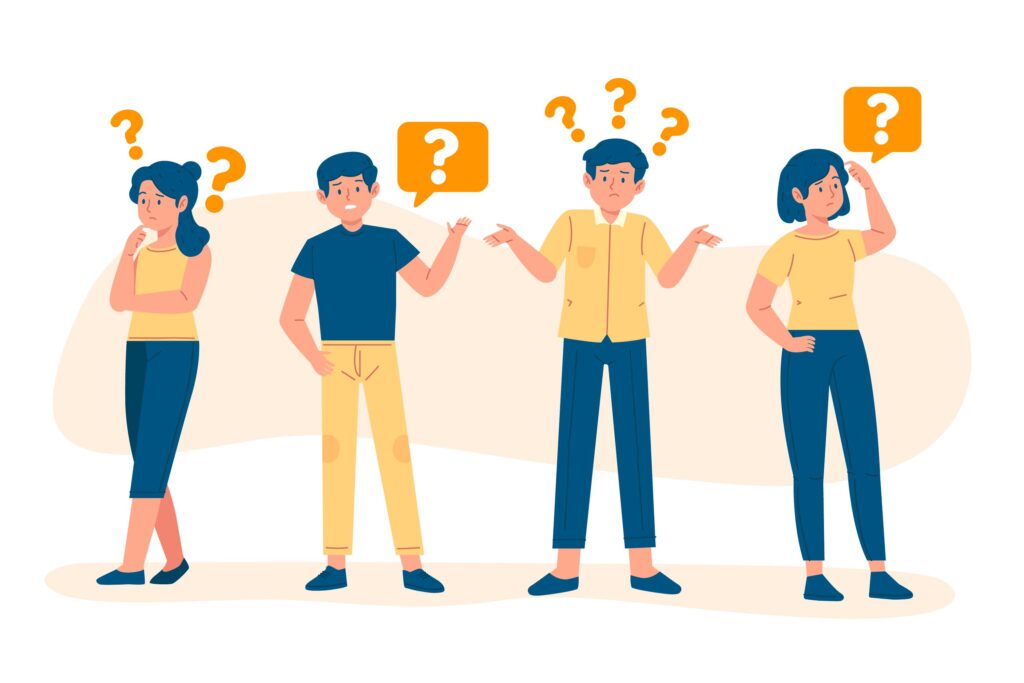
Who, what, when, and why In the 1970s, the American jazz group Manhattan Transfer posed the question, “Who is the guy?” The title of their song gave us a variety of question phrases, but they soon entered a universe that was grammatically absurd.
A List of the Question Words in English
The most typical English inquiry terms are listed below. There are nine (although the pronoun “whom” is fairly archaic and hardly used in everyday English). As you can see, eight out of the nine words start with the letter “Wh,” hence question words are also referred to as “W” or “Wh” words. Question words are more correctly referred to as “interrogative” terms.
Who – What – Where – Why – Which – When – Whose – Whom – How
In addition to these, English also uses the words “can,” “should,” and “would” to pose queries. These phrases frequently call for an affirmative, a “yes,” or both. These questions are not actually questions because they lead to an expected response.
There are two possible responses to these questions. “Open” solutions, which are debatable and based on opinion. “Closed” responses usually consist of a factual request for information and are brief.
Except for “why” and “how,” all of the aforementioned open-ended questions have been answered. This means that these are the most effective terms to employ when posing inquiries that invite conversation rather than only providing answers.
Preferred English Speaking Course in Delhi
Who is knocking on my door?
Used to determine who is performing the specific action in question. The response will typically be straightforward and factual.
Who is your closest companion?
Of course, you.
Also Read- Punctuation Marks in the English Language: A Brief Understanding
What is that large object in the corner?
When a query has a wide range of potential answers, the question word “what” is suitable. Those responses will typically be non-human and inorganic. The response is most likely to be a closed question, much like with “who” questions.
What kind of birthday present would you like?
“Everything from you will be unique.”
Where are you going?
The word “what” is appropriate when a question includes a wide variety of potential solutions. Usually, non-human and inorganic replies will be the result. The answer will probably be a closed question, much like “who” inquiries.
What kind of birthday gift are you hoping to receive?
“Everything you do will be different.”
Why does the sea rush to shore?
This is the most difficult question that asks for an explanation of the response. It is a question word intended to elicit a broad response.
Why does the sun appear to be so bright?
“Because you are here,” she replied.
Some Professionals even hesitate to ask questions in public, this is why we focus on this part in professional English speaking course.

Which is your favorite subject at college?
This resembles the “what” inquiries in many ways. While there are countless alternative responses to a “what” question, there are just a few options for “which.” Tough decisions must frequently be made in the response, it is likely to be accurate.
Which earring style suits me the best?
“Everything you wear looks fantastic.”
When do your dreams come true?
Whereas “who” inquiries have answers that pertain to specific persons or places, “where” questions have responses that relate to time. The answers, like those to the majority of the other questions, will probably be factual rather than subjective.
“When will dinner be ready?”
If you have finished cooking it by then, eight o’clock.
Whose voice is that I can hear?
The words “who” and “whose” in the question share some similarities. But a noun will always come after “whose.” The response will be concluded.
What kind of shoes are they?
“I believe they are mine,” you say.
Whom should I say is here?
This is a dated phrase that is hardly used today. Many natural English speakers are unsure about how to use it correctly. The word actually has the same function as “who” queries, although it is more frequently used when it is the verb’s object. There is really no reason to use the phrase in contemporary English.
“Who are they seeking?”
“Those with hairy legs.”
Suggested- Best English Speaking Institute in Delhi
How can I make you smile?
This is the second inquiry word, except “why,” which can occasionally elicit a lengthy answer. As a result, it is excellent for conversation.
How does one approach a rainbow?
“By identifying the starting point.”
Which prompts the original speaker to make another reply, such as “And how can I do that?”
But you can also use “how” to get the response to a straightforward query. How can I open the door?
Try to turn the handle.
Also, Read- The Benefits of Being Bilingual
Practising Use of the Appropriate Question Word
Like with most learning, you need to exercise the concept after you’ve grasped it in order to retain it. Try the following exercise to hone your skills (answers at the end).
Choose the appropriate question phrase to begin each phrase:
- _____ does the parcel arrive? (Response: Later this morning.)
- _____ has the color of my sweatshirt changed to white? (I spilled some bleach onto it.)
- To _____ should the letter be addressed? (Sir Reginald Smith-Rogers.)
- _____ did you leave the key? (In the door.)
- _____ are you feeling this morning? (A little better, thanks.)
- _____ do you change channels on the TV? (Press the button on the remote control!)
- _____ is the weather like outside? (Raining, as usual.)
- _____ type of flour makes the best muffins? (I like to use self-raising.)
- _____ is the weather warmest at the moment? (In the kitchen. We had a row!)
- _____ do you think you might be finished? (A lot sooner if you stop asking me questions.)
- I would like to know _____ you have washed my red top with my white shirt?
- To _____ should I send the reply?
- I am not sure _____ to address the letter to. Can you tell me?
- _____ name needs to go on the envelope? (As you can see, the last three questions are all similar ways of expressing the same question, but in each case the missing word is different.)
- At _____ time will you get home?
Answers:
- When – the question relates to time.
- Why – it is an open-ended question with many possible answers.
- Whom – the clue is in the starting word – ‘to’.
- Where – the question relates to place.
- How – a question with many answers.
- How – another question where there is no clue to the answer.
- What – a number of options are possible answers.
- Which – there are a limited number of types of flour.
- Where – the question relates to place.
- When – a question about time.
- Why – an open question.
- Whom – see above.
- Who – the first part of the example is not a question. This demonstrates that question words can be used in other situations.
- Whose – relating to a person.
- What – there are many answers to this question.
Suggested- WH family grammar exercises.
